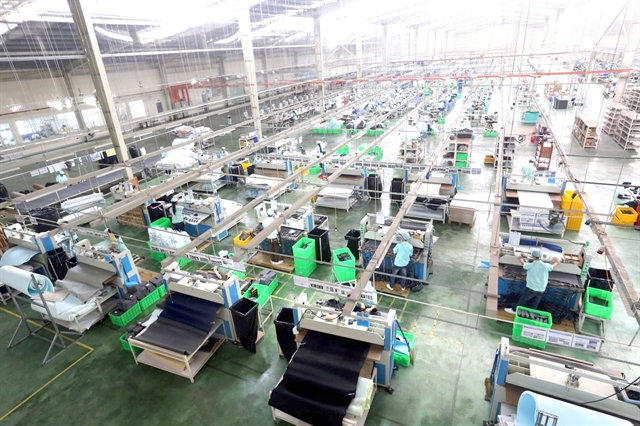 Economy
Economy

Foreign investment commitments to Việt Nam in the first half of this year decreased 15.1 per cent year-on-year to US$15.67 billion, a report from the Ministry of Planning and Investment's Foreign Investment Agency has shown.

|
| Footwear being made for export at the Japan-invested Midori Safety Footwear Việt Nam in Quảng Nam Province's Điện Nam-Điện Ngọc Industrial Zone. — VNA/VNS Photo Danh Lam |
HÀ NỘI — Foreign investment commitments to Việt Nam in the first half of this year decreased 15.1 per cent year-on-year to US$15.67 billion, a report from the Ministry of Planning and Investment's Foreign Investment Agency has shown.
In the period, 1,418 new projects were licensed with a total registered capital of $8.44 billion, down 18 per cent in the number of projects but up 14 per cent in capital year-on-year.
According to the agency, a surge in newly registered foreign direct investment (FDI) in the six-month period was attributable to the $4 billion-liquefied natural gas (LNG) plant project in the southern province of Bạc Liêu, accounting for 47.4 per cent of fresh FDI commitments.
At the same time, 526 existing projects were allowed to add $3.7 billion, up 27 per cent in capital.
Meanwhile, investors indirectly contributed $3.51 billion in 4,125 projects through share purchasing, up 2.6 per cent in the number of projects but down 57 per cent in value year-on-year.
Among 18 sectors receiving foreign capital, the processing and manufacturing industry attracted the most with more than $8 billion or 51 per cent of the total. Electricity production and distribution came next with $3.95 billion or 25 per cent, followed by wholesale and retail with $1.08 billion and real estate with nearly $850 million.
From January to June, Singapore remained the largest foreign investor of Việt Nam, pumping $5.44 billion or equivalent to 34.7 per cent of the total. Other main investors included Thailand, mainland China, Japan, South Korea, and Taiwan, statistics revealed.
Foreign investors channeled capital into 57 localities in the six month period. Of them, Bạc Liêu Province attracted the largest share of capital commitments with $4 billion, or 25.5 per cent of the total. HCM City ranked second with over $2 billion, or 13 per cent while Bà Rịa-Vũng Tàu with $1.95 billion or 12.4 per cent.
In its report, the agency also pointed out that exports by the foreign-invested sector in the period declined in both value and their proportion in Việt Nam’s total overseas shipments.
The sector's exports (including crude oil) reached an estimated $79.8 billion, down 6.7 per cent compared to the same period last year and accounting for 66 per cent of the country’s total figure.
Its imports stood at $65.6 billion, representing a yearly reduction of 5.6 per cent and making up 56 per cent of the country’s total imports in the first half of 2020.
However, the sector still posted a trade surplus of $14.2 billion. That helped make up for the deficit of nearly $10.2 billion in the domestic sector, contributing to Việt Nam’s trade surplus of over $4 billion during the six months, the agency noted.
Việt Nam has been regarded as a bright spot in the ASEAN region by investors thanks to its advantages of political stability, rapid and sustainable economic growth for many years, abundant workforce, big market, increasing per capita income, intensive and extensive international integration, and competitive incentives, plus its geographical location in the centre of Southeast Asia, head of the agency Đỗ Nhất Hoàng told the Vietnam News Agency.
In order to attract investment, the country has made continuous efforts to improve its investment environment, he said, citing the National Assembly’s ratification of relevant laws during its latest session, which are expected to have a positive impact on the national economy.
The Ministry of Planning and Investment has also proposed groups of solutions regarding investment promotion, project selection, investment environment improvement and incentives, the official added.
The official expressed his hope that after Việt Nam resumes international air routes, more investors will come to the country and the FDI flows will bounce back later this year, thus creating momentum for the years to come. — VNS